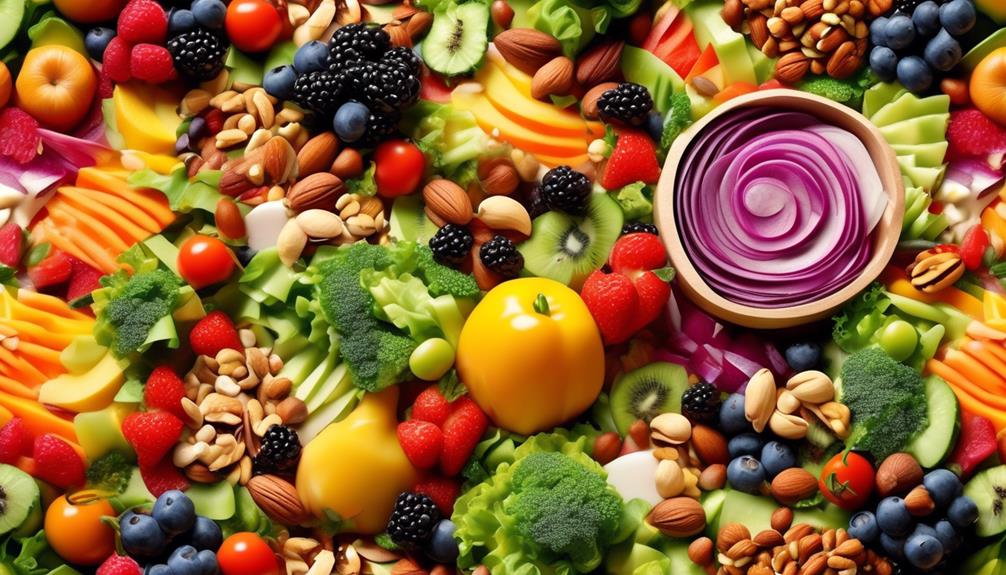Best Diet for Cutting Belly Fat: Unveiled Secrets
Looking to trim down and achieve a more streamlined physique? You might be interested in exploring the latest insights on the most effective dietary approach for reducing stubborn belly fat.
With numerous diets and trends out there, it can be overwhelming to navigate through the sea of information. But fear not, as there are proven strategies that can make a significant difference.
By uncovering the secrets of the best diet for cutting belly fat, you can take a step closer to achieving your fitness goals and feeling more confident in your own skin.
Key Takeaways
- Soluble fiber and healthy fats found in foods like avocados and nuts can help reduce belly fat and improve overall gut health.
- Incorporating whole, unprocessed foods into your diet and monitoring calorie intake can effectively manage weight and reduce belly fat.
- Intermittent fasting and strength training are effective strategies for improving metabolic health and increasing muscle mass, which can aid in reducing belly fat.
- Yogurt, lentils, olive oil, green tea, and quinoa are all beneficial foods that can support weight loss and help reduce belly fat.
The Science Behind Belly Fat
Understanding the science behind belly fat is crucial for implementing effective dietary and lifestyle changes to achieve your weight loss goals.
Belly fat, also known as abdominal or visceral fat, isn't just a cosmetic concern; it poses serious health risks.
Developing a weight loss strategy to specifically reduce belly fat involves incorporating various elements into your diet plan and lifestyle.
For instance, including soluble fiber in your diet can aid in reducing belly fat by promoting fullness and improving gut health.
Additionally, avoiding trans fats is essential as they contribute to inflammation, heart disease, and insulin resistance, all of which can lead to abdominal fat gain.
Moreover, incorporating healthy fats, such as those found in avocados and nuts, can help combat insulin resistance and reduce visceral fat.
Intermittent fasting and strength training are also effective strategies for reducing belly fat as they help improve metabolic health and increase muscle mass, which can contribute to a leaner abdominal area.
Understanding the scientific principles behind belly fat can guide you in making informed decisions to achieve your weight loss goals.
Understanding Dietary Strategies
To effectively tackle belly fat, incorporating specific dietary strategies into your daily routine is essential. Understanding how to eat in a way that promotes weight loss and reduces belly fat is crucial for achieving your goals. Here are three key dietary strategies to help you on your journey:
- Focus on Healthy, Whole Foods: Incorporating whole, unprocessed foods into your diet can help reduce belly fat and promote weight loss. Choose foods such as fruits, vegetables, lean proteins, and whole grains to support a healthy lifestyle and manage your weight effectively.
- Monitor Calorie Intake: Paying attention to your calorie intake is essential for weight management. Consuming fewer calories than your body needs can help you shed excess weight, including belly fat. Be mindful of portion sizes and opt for nutrient-dense, low-calorie foods.
- Pair Diet with Regular Exercise: While diet plays a significant role in weight management, incorporating regular exercise into your routine can further enhance your efforts to reduce belly fat. Engaging in physical activity supports healthy habits and contributes to overall well-being.
Effective Foods for Fat Loss
You want to focus on nutrient-dense foods that can help boost your metabolism and aid in fat loss.
Look for options that are high in soluble fiber, as it can promote weight loss and reduce belly fat.
Additionally, incorporating a high protein diet can help increase fullness, raise metabolic rate, and retain muscle mass, all of which contribute to effective fat loss.
Nutrient-Dense Foods
Incorporating nutrient-dense foods into your diet can significantly contribute to reducing belly fat and promoting overall health.
To achieve your weight loss goals, consider adding these effective foods to your diet:
- Yogurt: Supports gut health, rich in probiotics, and helps reduce belly fat.
- Lentils: Great source of fiber, protein, and aids in maintaining muscle mass during fat burning.
- Olive oil: Extra virgin olive oil reduces abdominal fat and supports normal cholesterol levels.
These nutrient-dense foods not only aid in fat loss but also provide essential nutrients for overall health.
Metabolism-Boosting Options
Considering yogurt's role in supporting gut health and reducing belly fat, it's essential to explore other metabolism-boosting options for effective fat loss.
In addition to yogurt, incorporating foods like lentils, olive oil, green tea, and quinoa into your diet can help with losing weight and reducing belly fat.
Lentils are rich in fiber and protein, curbing cravings and aiding in weight loss.
Olive oil, packed with monounsaturated fats, can help reduce abdominal fat and support weight loss.
Green tea is known to increase fat oxidation and boost metabolism, effectively reducing abdominal fat.
Quinoa, with its exceptional nutritional profile, can lower blood sugar levels and reduce belly fat.
Benefits of Cardio and Strength Training
You'll be glad to know that incorporating both cardio and strength training into your fitness routine offers numerous benefits for cutting belly fat.
Cardio exercises help torch calories and improve heart health, while strength training builds muscle to boost your metabolism.
Cardio for Fat Burning
Cardio exercises like running, swimming, or cycling are effective in burning calories and reducing overall body fat. When it comes to burning belly fat and losing weight, incorporating cardiovascular workouts into your routine can be incredibly beneficial. Here are a few reasons why you should consider adding cardio to your workout regimen:
- Burn More Calories: Cardio workouts help you burn more calories per day, aiding in weight loss and reducing excess abdominal fat.
- Improve Overall Health: Engaging in cardiovascular exercises can improve overall health and increase endurance, enhancing your fitness levels.
- Complement Strength Training: When combined with strength training, cardio can lead to comprehensive fat burning and improved overall fitness.
Strength for Muscle Tone
When it comes to achieving a toned abdomen and reducing belly fat, incorporating strength training into your workout regimen is essential for building muscle and increasing metabolic rate.
Strength training, also known as resistance training, not only helps in burning fat but also in increasing muscle mass. This, in turn, helps in losing excess abdominal fat as muscles burn more calories per day compared to fat.
When combined with a balanced diet and exercise, strength training can significantly contribute to losing fat, especially around the midsection. Make sure to include high-fiber foods and lean meats in your diet to support muscle growth and repair.
The Role of Protein in Fat Reduction
Protein plays a crucial role in reducing belly fat by increasing fullness and metabolic rate, aiding in muscle retention during weight loss efforts. Here's why you should focus on protein for fat reduction:
- Fullness and Metabolism: Protein curbs cravings and keeps you feeling full for longer, supporting weight loss efforts. Additionally, it enhances metabolism, promoting fat burning and aiding in the reduction of abdominal fat.
- Muscle Retention: When aiming to lose weight, a high-protein diet helps retain muscle mass. This is crucial for maintaining strength and promoting a toned physique, especially when combined with aerobic exercise.
- Nutrient Synergy: Incorporating protein-rich foods into your diet can aid in losing belly fat, especially when combined with other belly-fat-reducing nutrients such as soluble fiber, gut-healthy bacteria, and monounsaturated fats. These nutrients work together to regulate blood glucose levels and optimize fat metabolism.
Impact of Quality Sleep on Fat Loss
Prioritize quality sleep to optimize fat loss and reduce belly fat accumulation.
Research suggests that inadequate sleep can disrupt hormone levels, leading to increased appetite and weight gain, particularly around the abdomen.
Quality sleep plays a crucial role in supporting a healthy metabolism, which helps regulate energy balance and burn belly fat.
Moreover, insufficient sleep can lead to cravings for high-calorie and high-sugar foods, contributing to the accumulation of fat around the waist.
Additionally, poor sleep is associated with an increased risk of obesity and conditions such as sleep apnea, further hindering your weight loss journey.
Debunking Common Myths
If you've ever believed that spot reduction or crash diets are effective for losing belly fat, it's time to debunk these common myths. Here are the facts you need to know about cutting belly fat:
- Spot reduction works for belly fat - Targeting specific areas for fat loss isn't scientifically proven. Instead, focus on overall weight loss through a combination of healthy eating and exercise.
- Crash diets are effective for losing belly fat - Sustainable lifestyle changes are more effective than quick fixes. Rapid weight loss often leads to muscle loss and can result in regaining the weight back.
- Ab exercises alone can reduce belly fat - While they strengthen muscles, they won't specifically burn belly fat. Incorporating full-body workouts and cardio is essential for overall fat loss.
It's important to note that no specific food or exercise can exclusively target belly fat. Instead, a holistic approach that includes a balanced diet, regular exercise, and a healthy lifestyle is crucial for effective belly fat reduction.
Debunking these myths is essential for achieving sustainable weight loss and overall health and wellness.
Practical Tips for Success
Consistency remains the key to achieving long-term weight loss and reducing belly fat effectively. To see results, it's important to burn more calories than you consume. Incorporating practical tips into your daily routine can help in this process. Firstly, aim to maintain a healthy, balanced diet by consuming fewer calories than you burn each day. It's recommended to create a calorie deficit of 500-1000 calories per day to lose weight at a safe and sustainable rate of 1-2 pounds per week. Additionally, getting consistent sleep is crucial, as poor sleep can disrupt hunger hormones and lead to overeating. Moreover, monitoring your food intake, exercise, and measurements can help you stay motivated and on track. Seeking support from a weight loss group or healthcare professional can also provide guidance and accountability. Lastly, prioritizing overall health through balanced nutrition and regular physical activity is essential for long-term success.
| Practical Tips for Success | Details |
|---|---|
| Maintain a calorie deficit | Consume fewer calories than you burn each day to lose weight at a safe rate. |
| Get consistent sleep | Aim for 7-9 hours of quality sleep per night to support weight loss and overall health. |
| Seek support and guidance | Join a weight loss group or consult a healthcare professional for accountability and advice. |
Frequently Asked Questions
What Diet Gets Rid of Belly Fat the Fastest?
If you want to cut belly fat fast, focus on soluble fiber, avoid trans fats, limit alcohol, opt for a high-protein diet, and cut back on sugary foods and drinks. These changes can help you shed belly fat quickly.
Is There a Secret to Losing Belly Fat?
You've got the secret to losing belly fat right at your fingertips. Eating fiber-rich foods, avoiding trans fats, moderating alcohol, and choosing a high-protein diet while limiting sugar can help you trim that stubborn belly fat.
How to Lose 20 Pounds of Belly Fat in 2 Months?
To lose 20 pounds of belly fat in 2 months, focus on aerobic exercise, high protein diet, limiting sugary foods, strength training, and portion control. Commit to consistent effort and healthy choices for sustainable results.
What Burns Belly Fat the Most?
You want to know what burns belly fat the most. High-protein diets, soluble fiber, aerobic exercises, and strength training are your best bets. They increase fullness, promote weight loss, and help retain muscle mass for effective belly fat reduction.
Conclusion
Congratulations, you've unlocked the secrets to shedding that stubborn belly fat!
Now that you're armed with the knowledge of effective dietary strategies, the power of protein, the benefits of cardio and strength training, and the importance of quality sleep, you're well on your way to achieving your fat loss goals.
Remember, consistency is key, so keep up the good work, track your progress, and don't fall for those common myths.
Here's to a healthier, happier you!
Best Diet for Cutting Belly Fat: Unveiled Secrets
Looking to trim down and achieve a more streamlined physique? You might be interested in exploring the latest insights on the most effective dietary approach for reducing stubborn belly fat.
With numerous diets and trends out there, it can be overwhelming to navigate through the sea of information. But fear not, as there are proven strategies that can make a significant difference.
By uncovering the secrets of the best diet for cutting belly fat, you can take a step closer to achieving your fitness goals and feeling more confident in your own skin.
Key Takeaways
- Soluble fiber and healthy fats found in foods like avocados and nuts can help reduce belly fat and improve overall gut health.
- Incorporating whole, unprocessed foods into your diet and monitoring calorie intake can effectively manage weight and reduce belly fat.
- Intermittent fasting and strength training are effective strategies for improving metabolic health and increasing muscle mass, which can aid in reducing belly fat.
- Yogurt, lentils, olive oil, green tea, and quinoa are all beneficial foods that can support weight loss and help reduce belly fat.
The Science Behind Belly Fat
Understanding the science behind belly fat is crucial for implementing effective dietary and lifestyle changes to achieve your weight loss goals.
Belly fat, also known as abdominal or visceral fat, isn't just a cosmetic concern; it poses serious health risks.
Developing a weight loss strategy to specifically reduce belly fat involves incorporating various elements into your diet plan and lifestyle.
For instance, including soluble fiber in your diet can aid in reducing belly fat by promoting fullness and improving gut health.
Additionally, avoiding trans fats is essential as they contribute to inflammation, heart disease, and insulin resistance, all of which can lead to abdominal fat gain.
Moreover, incorporating healthy fats, such as those found in avocados and nuts, can help combat insulin resistance and reduce visceral fat.
Intermittent fasting and strength training are also effective strategies for reducing belly fat as they help improve metabolic health and increase muscle mass, which can contribute to a leaner abdominal area.
Understanding the scientific principles behind belly fat can guide you in making informed decisions to achieve your weight loss goals.
Understanding Dietary Strategies
To effectively tackle belly fat, incorporating specific dietary strategies into your daily routine is essential. Understanding how to eat in a way that promotes weight loss and reduces belly fat is crucial for achieving your goals. Here are three key dietary strategies to help you on your journey:
- Focus on Healthy, Whole Foods: Incorporating whole, unprocessed foods into your diet can help reduce belly fat and promote weight loss. Choose foods such as fruits, vegetables, lean proteins, and whole grains to support a healthy lifestyle and manage your weight effectively.
- Monitor Calorie Intake: Paying attention to your calorie intake is essential for weight management. Consuming fewer calories than your body needs can help you shed excess weight, including belly fat. Be mindful of portion sizes and opt for nutrient-dense, low-calorie foods.
- Pair Diet with Regular Exercise: While diet plays a significant role in weight management, incorporating regular exercise into your routine can further enhance your efforts to reduce belly fat. Engaging in physical activity supports healthy habits and contributes to overall well-being.
Effective Foods for Fat Loss
You want to focus on nutrient-dense foods that can help boost your metabolism and aid in fat loss.
Look for options that are high in soluble fiber, as it can promote weight loss and reduce belly fat.
Additionally, incorporating a high protein diet can help increase fullness, raise metabolic rate, and retain muscle mass, all of which contribute to effective fat loss.
Nutrient-Dense Foods
Incorporating nutrient-dense foods into your diet can significantly contribute to reducing belly fat and promoting overall health.
To achieve your weight loss goals, consider adding these effective foods to your diet:
- Yogurt: Supports gut health, rich in probiotics, and helps reduce belly fat.
- Lentils: Great source of fiber, protein, and aids in maintaining muscle mass during fat burning.
- Olive oil: Extra virgin olive oil reduces abdominal fat and supports normal cholesterol levels.
These nutrient-dense foods not only aid in fat loss but also provide essential nutrients for overall health.
Metabolism-Boosting Options
Considering yogurt's role in supporting gut health and reducing belly fat, it's essential to explore other metabolism-boosting options for effective fat loss.
In addition to yogurt, incorporating foods like lentils, olive oil, green tea, and quinoa into your diet can help with losing weight and reducing belly fat.
Lentils are rich in fiber and protein, curbing cravings and aiding in weight loss.
Olive oil, packed with monounsaturated fats, can help reduce abdominal fat and support weight loss.
Green tea is known to increase fat oxidation and boost metabolism, effectively reducing abdominal fat.
Quinoa, with its exceptional nutritional profile, can lower blood sugar levels and reduce belly fat.
Benefits of Cardio and Strength Training
You'll be glad to know that incorporating both cardio and strength training into your fitness routine offers numerous benefits for cutting belly fat.
Cardio exercises help torch calories and improve heart health, while strength training builds muscle to boost your metabolism.
Cardio for Fat Burning
Cardio exercises like running, swimming, or cycling are effective in burning calories and reducing overall body fat. When it comes to burning belly fat and losing weight, incorporating cardiovascular workouts into your routine can be incredibly beneficial. Here are a few reasons why you should consider adding cardio to your workout regimen:
- Burn More Calories: Cardio workouts help you burn more calories per day, aiding in weight loss and reducing excess abdominal fat.
- Improve Overall Health: Engaging in cardiovascular exercises can improve overall health and increase endurance, enhancing your fitness levels.
- Complement Strength Training: When combined with strength training, cardio can lead to comprehensive fat burning and improved overall fitness.
Strength for Muscle Tone
When it comes to achieving a toned abdomen and reducing belly fat, incorporating strength training into your workout regimen is essential for building muscle and increasing metabolic rate.
Strength training, also known as resistance training, not only helps in burning fat but also in increasing muscle mass. This, in turn, helps in losing excess abdominal fat as muscles burn more calories per day compared to fat.
When combined with a balanced diet and exercise, strength training can significantly contribute to losing fat, especially around the midsection. Make sure to include high-fiber foods and lean meats in your diet to support muscle growth and repair.
The Role of Protein in Fat Reduction
Protein plays a crucial role in reducing belly fat by increasing fullness and metabolic rate, aiding in muscle retention during weight loss efforts. Here's why you should focus on protein for fat reduction:
- Fullness and Metabolism: Protein curbs cravings and keeps you feeling full for longer, supporting weight loss efforts. Additionally, it enhances metabolism, promoting fat burning and aiding in the reduction of abdominal fat.
- Muscle Retention: When aiming to lose weight, a high-protein diet helps retain muscle mass. This is crucial for maintaining strength and promoting a toned physique, especially when combined with aerobic exercise.
- Nutrient Synergy: Incorporating protein-rich foods into your diet can aid in losing belly fat, especially when combined with other belly-fat-reducing nutrients such as soluble fiber, gut-healthy bacteria, and monounsaturated fats. These nutrients work together to regulate blood glucose levels and optimize fat metabolism.
Impact of Quality Sleep on Fat Loss
Prioritize quality sleep to optimize fat loss and reduce belly fat accumulation.
Research suggests that inadequate sleep can disrupt hormone levels, leading to increased appetite and weight gain, particularly around the abdomen.
Quality sleep plays a crucial role in supporting a healthy metabolism, which helps regulate energy balance and burn belly fat.
Moreover, insufficient sleep can lead to cravings for high-calorie and high-sugar foods, contributing to the accumulation of fat around the waist.
Additionally, poor sleep is associated with an increased risk of obesity and conditions such as sleep apnea, further hindering your weight loss journey.
Debunking Common Myths
If you've ever believed that spot reduction or crash diets are effective for losing belly fat, it's time to debunk these common myths. Here are the facts you need to know about cutting belly fat:
- Spot reduction works for belly fat - Targeting specific areas for fat loss isn't scientifically proven. Instead, focus on overall weight loss through a combination of healthy eating and exercise.
- Crash diets are effective for losing belly fat - Sustainable lifestyle changes are more effective than quick fixes. Rapid weight loss often leads to muscle loss and can result in regaining the weight back.
- Ab exercises alone can reduce belly fat - While they strengthen muscles, they won't specifically burn belly fat. Incorporating full-body workouts and cardio is essential for overall fat loss.
It's important to note that no specific food or exercise can exclusively target belly fat. Instead, a holistic approach that includes a balanced diet, regular exercise, and a healthy lifestyle is crucial for effective belly fat reduction.
Debunking these myths is essential for achieving sustainable weight loss and overall health and wellness.
Practical Tips for Success
Consistency remains the key to achieving long-term weight loss and reducing belly fat effectively. To see results, it's important to burn more calories than you consume. Incorporating practical tips into your daily routine can help in this process. Firstly, aim to maintain a healthy, balanced diet by consuming fewer calories than you burn each day. It's recommended to create a calorie deficit of 500-1000 calories per day to lose weight at a safe and sustainable rate of 1-2 pounds per week. Additionally, getting consistent sleep is crucial, as poor sleep can disrupt hunger hormones and lead to overeating. Moreover, monitoring your food intake, exercise, and measurements can help you stay motivated and on track. Seeking support from a weight loss group or healthcare professional can also provide guidance and accountability. Lastly, prioritizing overall health through balanced nutrition and regular physical activity is essential for long-term success.
| Practical Tips for Success | Details |
|---|---|
| Maintain a calorie deficit | Consume fewer calories than you burn each day to lose weight at a safe rate. |
| Get consistent sleep | Aim for 7-9 hours of quality sleep per night to support weight loss and overall health. |
| Seek support and guidance | Join a weight loss group or consult a healthcare professional for accountability and advice. |
Frequently Asked Questions
What Diet Gets Rid of Belly Fat the Fastest?
If you want to cut belly fat fast, focus on soluble fiber, avoid trans fats, limit alcohol, opt for a high-protein diet, and cut back on sugary foods and drinks. These changes can help you




